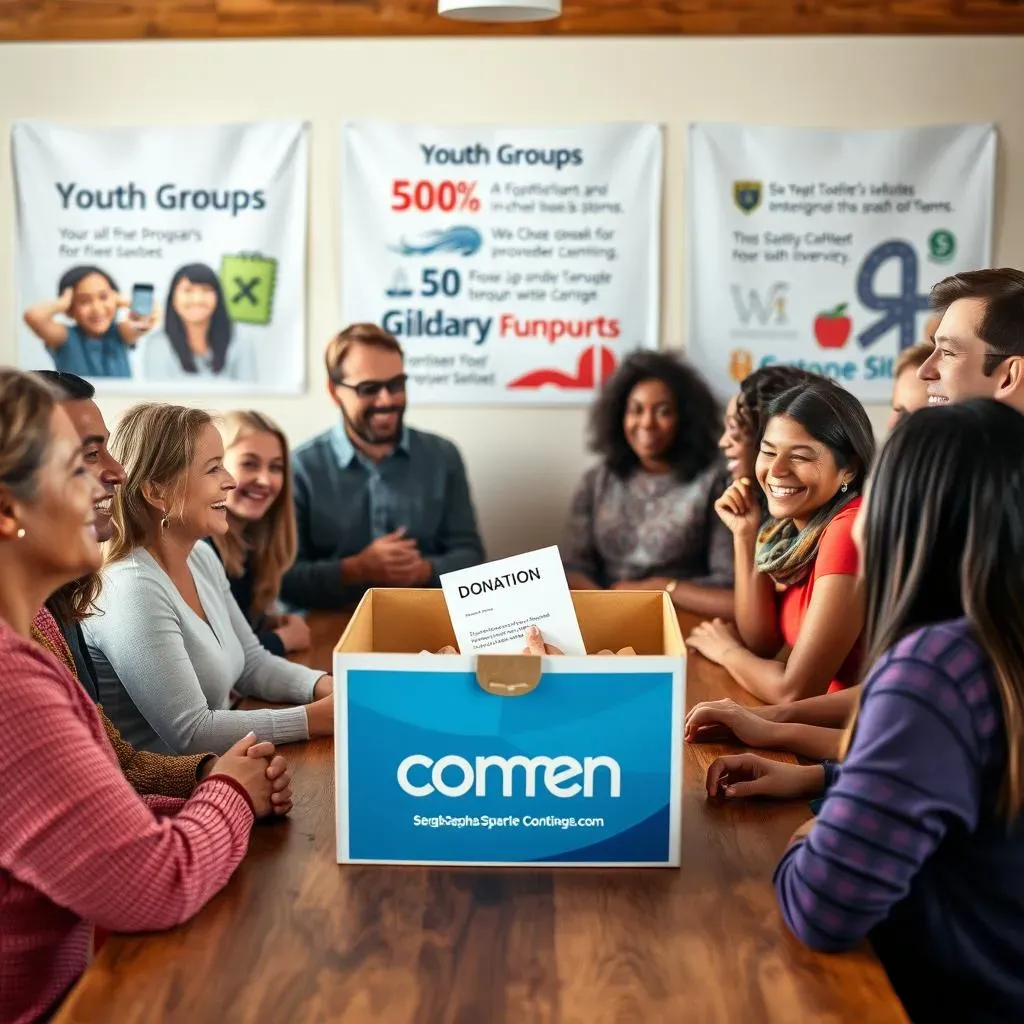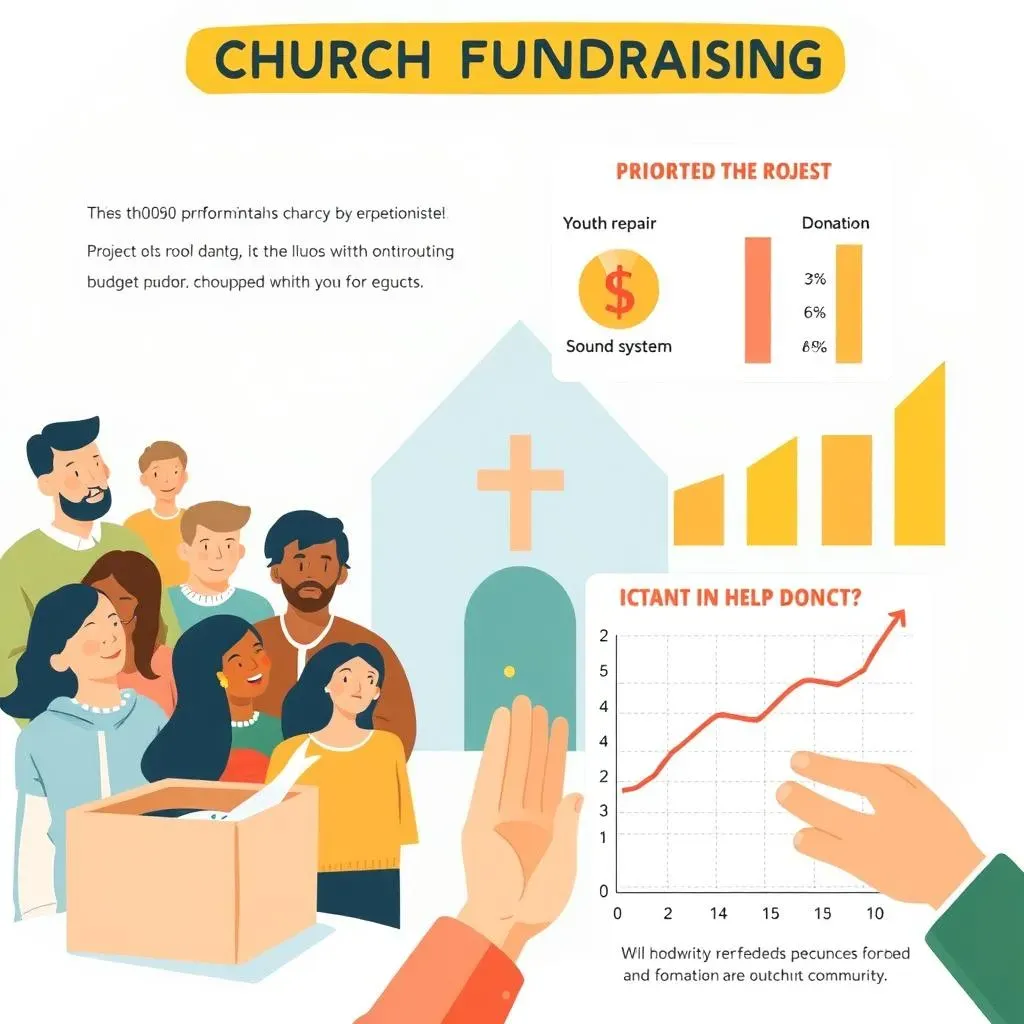Table of Contents
Planning a church fundraiser can feel overwhelming. Where do you even begin? This comprehensive guide tackles your most pressing questions with clear, actionable advice, answering your "Church fundraising FAQs" head-on. We'll explore why fundraising is vital for your church's continued success, guiding you through the process of selecting the most effective fundraising methods for your congregation and community. Discover proven strategies to boost your campaign's impact and learn how to maximize your resources, ensuring every dollar raised makes a significant difference. Whether you're a seasoned fundraising veteran or just starting out, this guide will equip you with the knowledge and confidence to run successful campaigns that strengthen your church and enrich the lives of those you serve. Let's dive in and unlock your church's fundraising potential!
Why is Church Fundraising Important?

Why is Church Fundraising Important?
Covering Basic Operational Costs
Let's face it: churches aren't exactly swimming in cash. While many rely on weekly offerings and tithes, these often fall short of covering essential expenses. Think about the upkeep of the building – repairs, utilities, landscaping – it all adds up! Fundraising bridges that gap, ensuring the church can maintain its facilities and provide a welcoming environment for its community. Without consistent fundraising efforts, essential services could be compromised, impacting the church's ability to fulfill its mission.
Regular maintenance and unexpected repairs are a constant reality. A leaky roof, a broken heating system, or even simple landscaping needs can quickly drain resources. Fundraising provides a safety net, allowing the church to address these issues promptly and prevent larger, more costly problems down the road. It's about proactive maintenance and financial stability, ensuring the church can continue its vital work without constant financial stress.
Supporting Church Programs and Ministries
Beyond basic upkeep, many churches offer a wide range of programs and ministries that enrich the lives of their members and the wider community. These could include youth groups, outreach initiatives, food banks, or educational programs. Fundraising is crucial for supporting these activities, providing the necessary funds to run them effectively. Without sufficient funding, these valuable programs might be forced to scale back or even shut down, limiting their positive impact.
Consider a church youth group planning a mission trip – the costs of travel, accommodation, and supplies can be substantial. Fundraising allows the church to provide these opportunities, fostering personal growth and a sense of community among young people. Similarly, outreach programs rely on fundraising to provide essential services to those in need, such as food, shelter, or counseling. Fundraising is the engine that drives these impactful initiatives.
Investing in the Future of the Church
Fundraising isn't just about meeting immediate needs; it's also about securing the church's future. This might involve long-term projects like building renovations, expansion, or the purchase of new equipment. These investments require significant financial resources, and fundraising provides a sustainable way to achieve these goals. By investing in its infrastructure and resources, the church ensures its continued relevance and ability to serve its community for years to come.
Imagine a church needing to renovate its outdated facilities to better accommodate its growing congregation. A successful fundraising campaign can make this vision a reality, creating a more comfortable and functional space for worship and community gatherings. Similarly, investing in new technology or educational resources can enhance the church's ability to connect with its members and engage in meaningful outreach. Fundraising is an investment in the church's growth and long-term sustainability.
Need | Funding Source |
|---|---|
Building Repairs | Fundraising Campaign |
Youth Program Supplies | Annual Fundraiser |
New Sound System | Special Event |
Church Fundraising FAQs: Choosing the Right Approach

Church Fundraising FAQs: Choosing the Right Approach
Assessing Your Church's Needs
Before diving into specific fundraising methods, take a step back and honestly assess your church's needs. What are your immediate priorities? Are you facing urgent repairs, aiming to launch a new youth program, or saving for a long-term project like building renovations? Defining your goals is crucial. It helps determine the type of fundraiser that will resonate most with your community and generate the necessary funds. A clear understanding of your needs will shape your entire fundraising strategy. Don't just throw spaghetti at the wall and see what sticks; be strategic!
For example, if your church desperately needs a new roof, a bake sale won't cut it. A larger-scale fundraising campaign, perhaps with a specific donation goal and timeline, would be more appropriate. Conversely, if you're aiming to raise funds for a smaller project like new playground equipment, a community event or a series of smaller fundraisers might be a better fit. Matching the fundraising approach to the specific need is key to success. Think carefully about how much you need to raise and the time you have to do it.
Considering Your Congregation and Community
Your fundraising approach should also consider the strengths and preferences of your congregation and the wider community you serve. Does your church have a strong network of volunteers willing to donate their time and skills? Are there local businesses willing to sponsor your events or donate items for an auction? Understanding your resources is just as crucial as understanding your needs. It influences the type of fundraiser you can realistically pull off. Don't underestimate the power of community involvement!
For instance, a church with many talented bakers might find a bake sale or a pie-baking contest a very effective way to raise funds. If your community is passionate about sports, organizing a charity golf tournament or a family fun run could be a great option. Involving your community creates a sense of shared purpose and increases your chances of success. Fundraising is a team effort, so engage everyone!
Resource | Fundraising Idea |
|---|---|
Talented Bakers | Bake Sale/Contest |
Local Businesses | Sponsorship/Auction |
Active Community | Charity Run/Tournament |
Effective Strategies for Church Fundraising Campaigns

Effective Strategies for Church Fundraising Campaigns
Setting Clear Goals and a Realistic Budget
Before you even start brainstorming fundraising ideas, you need a solid plan. What are you trying to achieve? Are you aiming for a specific monetary goal? Maybe you're raising funds for a new sound system, or perhaps you're saving for major renovations. Whatever it is, write it down! Then, create a realistic budget. How much will your chosen fundraising methods cost? Will you need to rent a space, buy materials, or hire help? Factor everything in. Knowing your financial picture upfront is crucial for success. A well-defined goal and a realistic budget prevent you from getting overwhelmed and keep you focused.
Think of it like building a house – you wouldn't start construction without blueprints and a materials list, would you? The same principle applies to fundraising. A clear plan keeps you on track, and it also helps you communicate your goals effectively to your congregation and community. People are more likely to support a cause when they understand exactly how their donations will be used. This transparency builds trust and encourages generosity. Having a clear plan makes your fundraising efforts more efficient and impactful.
Goal | Budget Item | Estimated Cost |
|---|---|---|
New Sound System | Equipment Rental | $500 |
Roof Repairs | Materials | $10,000 |
Youth Program | Staff Wages | $2,000 |
Leveraging Technology and Digital Platforms
In today's digital age, ignoring online fundraising tools is a major missed opportunity. Online donation platforms make it incredibly easy for people to contribute, regardless of their location. They offer convenience and security, which are huge draws for potential donors. Consider setting up an online donation page on a platform like Givelify or even using social media to promote your fundraising efforts. Digital tools can dramatically expand your reach and simplify the donation process. It's about making it as easy as possible for people to give.
Think about how many people check their phones or computers daily. An online donation page puts your church's fundraising efforts right at their fingertips. This convenience factor can significantly increase donations, especially among younger generations who are more accustomed to digital transactions. Furthermore, many online platforms offer features like recurring giving, allowing donors to make regular contributions. This consistent stream of income provides greater financial stability for your church. Embrace the power of technology to make your fundraising efforts more efficient and effective.
Building a Strong Team and Engaging Your Community
Successful fundraising isn't a one-person job. Build a dedicated team of volunteers who are passionate about your church and its mission. Delegate responsibilities, ensuring everyone has a clear role to play. This shared responsibility lightens the load and fosters a sense of community involvement. Remember, fundraising is about more than just money; it's about bringing people together to support a common cause. A strong team is the backbone of a successful fundraising campaign.
Don't forget the power of community engagement! Reach out to local businesses for sponsorships or donations. Consider partnering with other organizations for joint fundraising events. The more people you involve, the greater your reach and the more likely you are to reach your fundraising goals. Think creatively about ways to engage your community. Perhaps you could host a community event that combines fundraising with fellowship and fun. This shared experience can strengthen community ties and create lasting memories while raising vital funds for your church.
Church Fundraising FAQs: Maximizing Your Impact and Resources

Church Fundraising FAQs: Maximizing Your Impact and Resources
Strategic Allocation of Funds
Once you've raised the funds, how do you ensure they're used effectively? Creating a transparent and detailed budget is crucial. This isn't just about tracking expenses; it's about demonstrating accountability to your congregation and ensuring that every dollar contributes to your church's mission. Regularly review your budget, making adjustments as needed. Share this budget with your church community to build trust and show how their generosity is making a tangible difference. Transparency is key to maximizing your impact.
Consider prioritizing needs versus wants. Urgent repairs might take precedence over a new sound system. Prioritizing helps you focus your resources where they're most needed and helps demonstrate responsible stewardship of the funds you've raised. Involving your church leadership in these decisions ensures alignment with the church's overall mission and values. Careful planning prevents squandering resources and ensures maximum impact.
Priority | Project | Budget Allocation |
|---|---|---|
High | Roof Repair | $10,000 |
Medium | Youth Program Enhancement | $5,000 |
Low | New Sound System | $2,000 |
Building Long-Term Sustainability
Don't just focus on one-off fundraising events; strive for long-term financial sustainability. This might involve establishing an annual fundraising plan, diversifying your fundraising strategies, or creating a system for recurring donations. Recurring giving programs provide a consistent income stream, reducing reliance on sporadic fundraising efforts. This stability makes long-term planning easier and allows for greater financial security. It's about building a strong foundation for your church's financial health.
Consider exploring grant opportunities or partnering with other organizations to expand your fundraising reach. Grants can provide significant funding for specific projects, while partnerships can open doors to new donor networks. This broader approach reduces the pressure on your congregation and helps ensure the long-term financial health of your church. Remember that long-term sustainability is about more than just raising money; it's about building a strong and resilient financial foundation for your church.
Measuring Your Success and Reporting Back
Finally, don't forget to measure the success of your fundraising efforts. Track your income and expenses carefully. Compare your actual results to your initial goals. This data provides valuable insights for future campaigns, allowing you to refine your strategies and maximize your impact. Regular reporting back to your congregation demonstrates transparency and builds trust. It shows how their contributions are making a difference.
Celebrate your successes! Acknowledge the hard work of your volunteers and the generosity of your donors. Publicly recognize their contributions, highlighting the positive impact of their support. This positive reinforcement encourages continued participation and strengthens the sense of community around your fundraising efforts. It's about building a culture of giving and celebrating your collective accomplishments.
